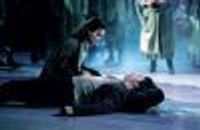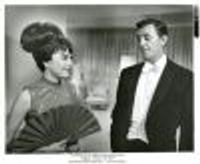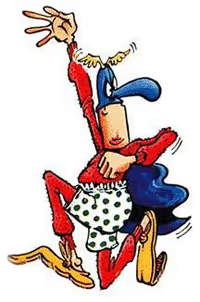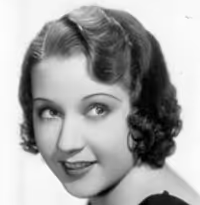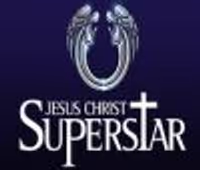The Who's Tommy - Offensive?
#1The Who's Tommy - Offensive?
Posted: 2/14/08 at 3:01am
The community theatre I am involved with is in the process of considering musicals to do over the next year, and I innocently mentioned "The Who's Tommy" as a possibility. One of the staff members expressed that she would had serious reservations about that pick. She is very involved with accessibility issues and while she hasn't seen the show, she was concerned about the way the script deals with a character who is "deaf, blind and dumb".
I've only heard the CD, and it takes a lot to offend me, and she is perhaps being a bit hyper-sensitive, but would the show really be offensive to anyone in that community? Is this a reason to never do it?
I can't imagine a mainstream Broadway musical from 1993 could have been that problematic, as I can't remember hearing about any complants at the time, at least as far as its topic concerning someone who is "challenged".
Does anyone have enough familiarity with the show to help me out here? Personally, even if there are moments that show negative moments, I don't think you can write off every show that contains a viewpoint that you don't agree with.
Still, her point is that she feels the theatre needs to be sensitive to its audience, and as they are actively trying to make the theatre accessible to all audiences, (which I don't have a problem with), she thinks the theatre needs to steer clear of any show that could offend this audience.
Any thoughts?
#2re: The Who's Tommy - Offensive?
Posted: 2/14/08 at 3:30am
i like the show, I've done the show. She's prob talking about how Tommy is sexually abused and physically abused as a kid and it is becasue he can't and wont tell anyone that his uncle and Kevin do these things to him. But its a well known show that people should know kind of what they are getting into if they are going to see it since its based off of a Who Album its very well known to even non theater people.
She seems like someone who would be upset by a lot of theater.
#3re: The Who's Tommy - Offensive?
Posted: 2/14/08 at 3:44am
She means well, but she is an advocate for the disabled community, so I think she looks at things from that viewpoint.
I agree with you though. I hate the politics of theatres striving not to offend people, when theatre should be about challenging people from time to time. I understand the desire not to drive off potential audiences though. Doesn't mean I have to like it.
Yankeefan007
Broadway Legend Joined: 3/20/04
#4re: The Who's Tommy - Offensive?
Posted: 2/14/08 at 7:00amDeaf, dumb, and blind kid sure plays a mean pinball.
george95
Broadway Legend Joined: 1/1/08
#5re: The Who's Tommy - Offensive?
Posted: 2/14/08 at 8:28am
Would this advocate for the disabled be ok with The Who's Tommy if you changed the lyrics to "that audio-challenged, developementally-challenged, visually-challenged kid sure plays a mean pinball" ?
I agree she does mean well, but I think people like that are more dangerous that the people who write offensive lyrics.
#6re: The Who's Tommy - Offensive?
Posted: 2/14/08 at 8:45am
I personally feel the show is about learning acceptence, overcoming obstacles and seeing that because God took away his speech, sight and hearing, he gave him extra sensory powers of perception and intuition.
Many people like Tommy are abused. If she is an advocate of the diabled, she should see it as an opportunity for awareness, to show and say "This is how some of these people are treated and help me do something about it."
The music isn't bad, either ![]()
Elton John in those boots as the Pinball Wizard still ranks up there with the best of it *lol*
#7re: The Who's Tommy - Offensive?
Posted: 2/14/08 at 11:04am
For those who know the plot of TOMMY -- he isn't born: deaf, dumb and blind. By witnessing a traumatic experience (the murder of his mom's lover by his thought-to-be-dead father), he becomes this way. He later gains all his senses back.
As for the poster asking if Broadway was ready for this back in 1993-94? Broadway is one thing -- community theater is another. Anything is applicable on Broadway, from profanity to nudity... and yes, EVEN in musicals. Community theater companies tend to 'clean-up' these sections in their shows for their community audiences.
UPDATE: edited with the heads-up correction. Memory went blank for a second. Thanks!
Updated On: 2/14/08 at 11:04 AM
#8re: The Who's Tommy - Offensive?
Posted: 2/14/08 at 12:03pm
(the murder of his father by his mother's current beau)
It's the other way around.
markymatt
Understudy Joined: 3/18/05
#9re: The Who's Tommy - Offensive?
Posted: 2/14/08 at 12:36pm
How soon do you have to decide? I would recommend buying a copy of the libretto and letting her read it. A lot of time, if people have preconceived opinions, it's better to just let the material speak for itself.
But, you do have to remember--even though it was a mainstream Broadway musical in 1993, it was written by a rock band in pre-pc 1969.
Cruel_Sandwich
Broadway Legend Joined: 6/30/05
#11re: The Who's Tommy - Offensive?
Posted: 2/14/08 at 12:58pm
to reiterate what Brody said, this isn't really a musical about a person with multiple disabilities (deaf-blindness). It's about a kid with PTSD whose mind blocks sensory perception, at least socially. (Sorry, I'm a psychologist by training and special educator by profession, so I'm nit-picky about this. Tommy is also one of my favorite musicals, so I'm double nit-picky).
As the doctor sings in Go to the Mirror: "His eyes react to light; the dials detect it. He hears but cannot answer to your call." And later "His eyes can see, His ears can hear, his lips can speak. All the time the needles flick and rock. No machine can give the kind of stimulation, Needed to remove his inner block."
In other words, while this musical uses the terms deaf, dumb, and blind, Tommy isn't really any of those things, and I think it's a misunderstanding of the material to see it as a depiction of a person with disabilities.
That having been said, I haven't seen a community production yet that wasn't pretty awful.
#12re: The Who's Tommy - Offensive?
Posted: 2/14/08 at 12:58pmThis thread has made me dig out my Tommy recordings. I'd almost forgotten how much I like Kim Wilde and Natalie Powers as Mrs Walker.
#13re: The Who's Tommy - Offensive?
Posted: 2/14/08 at 1:25pm
Dead Parrot, I think you have gotten some pretty good responses here and maybe you should print out this thread and use it. Maybe suggest to her that a summary of the show be put in the programs. Although, anyone paying attention to the show should know that he was not this way at birth. Just a few random thoughts.
#14re: The Who's Tommy - Offensive?
Posted: 2/14/08 at 2:39pmGREAT thread here, and I love your suggestions uncageg.
#15re: The Who's Tommy - Offensive?
Posted: 2/14/08 at 2:50pm
There is something we do here at the Denver Center Theater Company that I like. In the lobby, there is a place where you can get printed information on the show you are about to see (We have 4 stages) It is called Inside Out. here is the link to a show opening next week called "Lydia" (I see it next Saturday evening). You might want to do something like this.
http://www.denvercenter.org/pdf/Lydia%20sg.pdf
#16re: The Who's Tommy - Offensive?
Posted: 2/14/08 at 3:45pmTommy isn't offensive to the deaf or the blind. Only to the dumb.
#17re: The Who's Tommy - Offensive?
Posted: 2/14/08 at 4:34pm
She is very involved with accessibility issues and while she hasn't seen the show, she was concerned about the way the script deals with a character who is "deaf, blind and dumb".
I would ask her what specifically concerns her if she isn't familiar with the show. It sounds like she's made assumptions based on...well...no evidence whatsoever.
Now, I do know several community theatres that would have a tough time trying to get audiences to sit through Fiddle About and Acid Queen. Suburban soccer moms and senior citizens are more likely to walk out when they see a grown man seducing a small psychologically defenseless child into his bed or watching a junkie shoot up heroin on stage.
But as for the disability issue, it's a temporary psychological state, not a permanent physical disability. But there are SO MANY people out there just begging to be offended by anything, so you're probably screwed no matter what you do.
sonamdolma
Swing Joined: 6/29/23
#18re: The Who's Tommy - Offensive?
Posted: 6/29/23 at 10:11pm
Hello. I know your question is quite old now, but in case anyone finds this discussion while Googling, I'd like to add my two cents. I'm a sign language interpreter. I have talked to several Deaf people about The Who's Tommy, and they confirmed my initial feeling that yes, the story demeans Deaf, Deaf-Blind, and Blind people yes, it is offensive. It doesn't matter that the character Tommy wasn't truly deaf or blind (which is a little contradictory, he can't see or hear but he's not deaf or blind?). And it's not simply the phrase "deaf, dumb, and blind" which is offensive. It's not merely those three words that matter.
What matters is that the big crisis of the story is that Tommy, who was born hearing and sighted, is now deaf and blind. And the moment he loses his sight and hearing, this is represented by him becoming totally unresponsive, catatonic, practically a zombie on the stage. He spends his whole childhood in a daze like this, and does not respond to his family's touch or movement or any attempts at communication, because he can't hear or see them.
Deaf, blind, and deaf-blind people are not zombies. They are normal people. If you get to know them, you find they are just normal people. If this doesn't make sense to you, it means you haven't met Deaf, blind, or deaf-blind people. They have relationships just like everyone else. This story is a very ignorant, (and outdated) portrayal of this community and their experience. It appears it was written with not much research, not much attempt to get to know a real Deaf-blind person, but represents Deaf-blindness strictly from the point of view of hearing, sighted people who imagine and project all kinds of crazy ideas onto Deaf-blind people. THAT is the problem with this show.
If anyone thinks this is a picky point, listen, I LOVE the music of this show. But seeing Deaf people in the audience, squirming uncomfortably all through the show, looking disgusted, depressed, and dejected while the hearing audience is cheering and having a great time, come on, can we ignore that? It ruins the show for me. I love the music, and I love Pete Townshend, but it's not worth hurting whole communities of people. It's really hurtful. I want to say, "Pete, please could you re-write this show and just make it about a boy who is severely traumatized, and can't communicate, and just leave it at that?" Don't drag the deaf and blind and deaf-blind communities into it, who are already so misunderstood by most people in the world. Leave them out of it.
Besides the deaf, blind, and deaf-blind audience members having to endure this ignorant portrayal of people like them, then they have to witness the Deaf-blind character, being assaulted, bullied, tortured in many ways, and also repeatedly subjected to a different kind of assault at the hands of the medical system.
Oh but wait, then comes the jubilant happy ending... he CAN actually hear and see... he is "normal", hooray, phew, he's healed, and everything is okay, he's not deaf and blind after all, phew, he's free. Free from the "prison" of being deaf-blind, hallelujah. Then family and audience and Tommy himself rejoice rejoice rejoice. and that's the happy ending.
So it's very good that you sincerely asked this question-- Is The Who's Tommy offensive? If you don't have the benefit of having deaf or blind or deaf-blind people in your life, like I do, you still can get close to the answer, yourself. Just think, really try to imagine-- how would you feel if you're a deaf or blind or deaf-blind person in the audience? You buy your ticket, you've heard this is a great show, you love theater, you and your partner get your seats and are ready to enjoy the show, and then as the story unfolds, you witness this ugly, misguided portrayal of life as a deaf-blind person, and the hearing audience singing along and loving this story. Isn't that something like a minstrel show? Do YOU think it's offensive?
Or, look at the story again, and try to imagine, what if this story is describing Tommy has the characteristics of you and your people? Think about something central to your identity, something that people don't understand, and imagine, that the crisis of the story is that Tommy had a trauma that made him become like YOU in this way, like you and your people. And then instead of the story showing the characters learning that there is nothing wrong with being that way, it's actually fine, that the problem was society, not Tommy. But no, the joyful ending is that, thank goodness, Tommy is not that way at all. He's not like that part of YOU that people misunderstand, no, he's normal, he is just like everyone else, in just the way they wished he would be. So we can all be happy and sing and feel great, because it turns out Tommy is okay, he's not like YOU at all, thank goodness.
I hope I don't seem to be shaming anyone for not understanding these things at first. If you haven't met deaf, blind, or deaf-blind people, then how would you know? You would never have a chance to know that they are just regular people like yourself. And if the offensiveness of Tommy ends up creating discussions like this, where hearing, sighted people can think about WHY it really is offensive, how it feels to that community of people, well then maybe something good can come out of it.
With all due respect, Pete Townshend should just re-write the story.
Zeppie2022
Broadway Legend Joined: 7/12/22
#19re: The Who's Tommy - Offensive?
Posted: 6/29/23 at 10:48pm
"With all due respect, Pete Townshend should just re-write the story."
He is now 78 years old and a rock legend. The album "Tommy" is the bestselling album probably in his entire career. The album was released in 1969 which makes it over 50 years old. The musical "Tommy" opened on Broadway in 1993 and was nominated for 10 Tony Awards including "Best Original Score". I truly doubt he would think of changing one thing because some people are offended with his portrayal of "Tommy". I believe most of us are very sympathetic to people who have these physical issues, but I think most of us understand this is fiction and it is about imaginary events and people.
#20re: The Who's Tommy - Offensive?
Posted: 6/30/23 at 1:19am
Salene said: "(the murder of his father by his mother's current beau)
It's the other way around."
Depends on which version you're seeing. Only in the movie does the lover kill the father.
#21re: The Who's Tommy - Offensive?
Posted: 6/30/23 at 1:29am
sonamdolma said: "Hello. I know your question is quite old now, but in case anyone finds this discussion while Googling, I'd like to add my two cents. I'm a sign language interpreter. I have talked to several Deaf people about The Who's Tommy, and they confirmed my initial feeling that yes, the story demeans Deaf, Deaf-Blind, and Blind people yes, it is offensive. It doesn't matter that the character Tommy wasn't truly deaf or blind (which is a little contradictory, he can't see or hear but he's not deaf or blind?). And it's not simply the phrase "deaf, dumb, and blind" which is offensive. It's not merely those three words that matter.
What matters is that the big crisis of the story is that Tommy, who was born hearing and sighted, is now deaf and blind. And the moment he loses his sight and hearing, this is represented by him becoming totally unresponsive, catatonic, practically a zombie on the stage. He spends his whole childhood in a daze like this, and does not respond to his family's touch or movement or any attempts at communication, because he can't hear or see them.
Deaf, blind, and deaf-blind people are not zombies. They are normal people. If you get to know them, you find they are just normal people. If this doesn't make sense to you, it means you haven't met Deaf, blind, or deaf-blind people. They have relationships just like everyone else. This story is a very ignorant, (and outdated) portrayal of this community and their experience. It appears it was written with not much research, not much attempt to get to know a real Deaf-blind person, but represents Deaf-blindness strictly from the point of view of hearing, sighted people who imagine and project all kinds of crazy ideas onto Deaf-blind people. THAT is the problem with this show.
If anyone thinks this is a picky point, listen, I LOVE the music of this show. But seeing Deaf people in the audience, squirming uncomfortably all through the show, looking disgusted, depressed, and dejected while the hearing audience is cheering and having a great time, come on, can we ignore that? It ruins the show for me. I love the music, and I love Pete Townshend, but it's not worth hurting whole communities of people. It's really hurtful. I want to say, "Pete, please could you re-write this show and just make it about a boy who is severely traumatized, and can't communicate, and just leave it at that?" Don't drag the deaf and blind and deaf-blind communities into it, who are already so misunderstood by most people in the world. Leave them out of it.
Besides the deaf, blind, and deaf-blind audience members having to endure this ignorant portrayal of people like them, then they have to witness the Deaf-blind character, being assaulted, bullied, tortured in many ways, and also repeatedly subjected to a different kind of assault at the hands of the medical system.
Oh but wait, then comes the jubilant happy ending... he CAN actually hear and see... he is "normal", hooray, phew, he's healed, and everything is okay, he's not deaf and blind after all, phew, he's free. Free from the "prison" of being deaf-blind, hallelujah. Then family and audience and Tommy himself rejoice rejoice rejoice. and that's the happy ending.
So it's very good that you sincerely asked this question-- Is The Who's Tommy offensive? If you don't have the benefit of having deaf or blind or deaf-blind people in your life, like I do, you still can get close to the answer, yourself. Just think, really try to imagine-- how would you feel if you're a deaf or blind or deaf-blind person in the audience? You buy your ticket, you've heard this is a great show, you love theater, you and your partner get your seats and are ready to enjoy the show, and then as the story unfolds, you witness this ugly, misguided portrayal of life as a deaf-blind person, and the hearing audience singing along and loving this story. Isn't that something like a minstrel show? Do YOU think it's offensive?
Or, look at the story again, and try to imagine, what if this story is describing Tommy has the characteristics of you and your people? Think about something central to your identity, something that people don't understand, and imagine, that the crisis of the story is that Tommy had a trauma that made him become like YOU in this way, like you and your people. And then instead of the story showing the characters learning that there is nothing wrong with being that way, it's actually fine, that the problem was society, not Tommy. But no, the joyful ending is that, thank goodness, Tommy is not that way at all. He's not like that part of YOU that people misunderstand, no, he's normal, he is just like everyone else, in just the way they wished he would be. So we can all be happy and sing and feel great, because it turns out Tommy is okay, he's not like YOU at all, thank goodness.
I hope I don't seem to be shaming anyone for not understanding these things at first. If you haven't met deaf, blind, or deaf-blind people, then how would you know? You would never have a chance to know that they are just regular people like yourself. And if the offensiveness of Tommy ends up creating discussions like this, where hearing, sighted people can think about WHY it really is offensive, how it feels to that community of people, well then maybe something good can come out of it.
With all due respect, Pete Townshend should just re-write the story."
Will all due respect, they are missing the point. Tommy isn't a realistic depiction of a person with sight, hearing and speech disabilities--it's an allegory of pain and spiritual development. It isn't meant to represent reality at all (the original album takes place between 1921 and 1941 or so, but there's pinball before the game was invented, and somehow a WWI but no WWII). I'm certainly not telling anyone how to feel about the work, but it simply isn't about real disabled people. Who becomes deaf, blind and mute psychosomatically? It's a very beautiful work, though I don't much care for the stage version.
#22re: The Who's Tommy - Offensive?
Posted: 6/30/23 at 3:53am
I do not believe that you are being truthful with your account of this supposed concerned person; and I do believe that you are participating in troll activities.
#23re: The Who's Tommy - Offensive?
Posted: 6/30/23 at 7:28am
My only outlet to the show is the current Goodman production and I was truly gobsmacked at what was playing on stage and now the audience was laughing and cheering. Like dude is assaulted in different ways then they sing a song about why he can’t be like the other kids.. then he becomes a pinball Jesus figure… it’s a bizarre show. It’s not for me. But clearly it has a fan base.
#24re: The Who's Tommy - Offensive?
Posted: 6/30/23 at 10:42am
RippedMan said: "My only outlet to the show is the current Goodman production and I was truly gobsmacked at what was playing on stage and now the audience was laughing and cheering. Like dude is assaulted in different ways then they sing a song about why he can’t be like the other kids.. then he becomes a pinball Jesus figure… it’s a bizarre show. It’s not for me. But clearly it has a fan base."
The two songs about abuse are often played for dark humor, but this doesn't mean the audience is enjoying the abuse.
The parents sing a song about why he can't be like other kids because they feel guilty and ashamed over their crime (murder) and because they love him, and want him to be able to be normal like everyone else.
He becomes spriitually enlightened because, akin to an intense meditation program, he's shut off his senses and focused his mind and achieved enlightenment.
He plays pinball because...well, he plays pinball because an influential British rock critic in the late 60's was a pinball fanatic, and Townsend knew if he threw that in, he'd get a great review. But it does work to add a sense of playfulness and silliness to an otherwise very heavy Hesse-like story.
It's totally fine not to like the show or the material. Not like you need my okay to have your own reaction, I just want to say in spite trying to explain some of the show's aspects, I'm not slamming you for not liking it.
#25re: The Who's Tommy - Offensive?
Posted: 6/30/23 at 10:53am
FWIW, MTI used to give schools enough leeway to cut both "Fiddle About" and "Acid Queen" to assuage sensitive audiences (or cast members of what some might deem an inappropriate age). I haven't seen a current catalog in ages, so this may have changed.
Broadway Legend
joined: 5/1/05
Blocked: After Eight, suestorm, david_fick, emlodik, lovebwy, Dave28282, joevitus, BorisTomashevsky, Seb28
Videos





